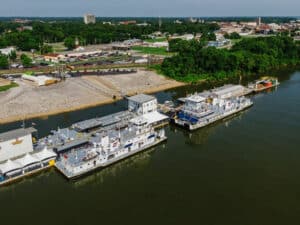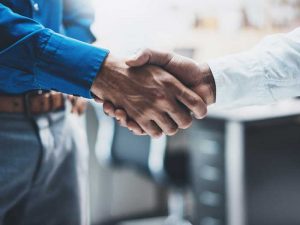
10 Minutes with Rev. Thomas Rhoades of Seamen’s Church Institute
Written by Heather Ervin
SCI’s mission to help maritime employees live well amid the challenges of life on the water is reflected by what it does improve their mental, physical, emotional and spiritual health.
The Seamen’s Church Institute (SCI), the largest and most comprehensive service agency serving mariners and seafarers in North America headquartered in New York, N.Y., is dedicated to advocating for the personal, professional, and spiritual well-being of merchant mariners and seafarers around the world. Through an extensive range of programs, and a fiercely dedicated staff, SCI has built a community that looks after the mental health and wellness of mariners and seafarers in a myriad of ways.
Among their several initiatives, their Crisis Intervention Program (CIP) is particularly important in achieving the purpose of wellness. CIP retains 40 deployable chaplains across the U.S., with certifications ranging from critical incident stress management to applied suicide intervention skills training, and wellness advocacy. CIP both responds in situations of crisis, and helps preemptively prevent crises through fostering the skills and practices necessary to maintain both physical and mental health and wellness.
Marine Log spoke with Rev. Thomas Rhoades, a full-time Gulf chaplain for the Seamen’s Church Institute’s Crisis Intervention Program, about the background and mission of CIP, its numerous programs and initiatives, and advice for seafarers and mariners on how to maintain good mental health and wellness while on the water.
Marine Log (ML): Can you introduce SCI’s Crisis Intervention Program and describe its mission?
Rev. Thomas Rhoades (TR): When we intervene, we help mariners and seafarers make better decisions in self care. We try to break the cycle of wanting different results when we keep behaving the same way based on how we learned to deal with stress from our families, communities, and co-workers. Our mission is to help mariners and seafarers live well amid the challenges of life on the water.
When there is an uncommon event or continuing situation that causes an intense reaction through our senses and penetrates our nervous system, pressure accumulates in microseconds. SCI’s crisis intervention facilitates the release of this stress through talking about the incident.
Our chaplains gather with those who experienced a traumatic event, ask for details about what occurred, what thoughts ran through their minds, and how they felt. Then we talk about possible physical symptoms that may follow, sleeplessness, loss of appetite, high anxiety, an inability to focus, that sort of thing. Usually, we pray– but we don’t force prayer. A good chaplain is in tune with what’s going on in and around people and never imposes spiritual practices. The intervention is called Critical Incident Stress Management (CISM) and we have 25 chaplains trained and certified in individual and group CISM by the International Critical Incident Stress Foundation.
The purpose of talking to people following a traumatic event is to intervene and redirect the stress so that it moves out of a person’s life. When terrible experiences are not addressed and our thoughts and feelings are not exposed and we stuff them away and close the lids on our hearts, minds and even souls, then pain and suffering get stuck inside our bodies. The pain then seeps its way out of us as anger, frustration, fear, and even hate that damages our relationship with ourselves and those around us. Meanness and disrespect flow out of this well of suffering. To deaden the pain, we self-medicate with comfort food, alcohol, and drugs. We live lives that are not in our own best interest.
All of us experience traumatic events: divorce, death, tornadoes, natural disasters and workplace death and injury. Examples in maritime include falls overboard, crushing, explosions, fires, near misses, recovering of remains and other events. Hurricane Ida did not cause any direct mariner or seafarer deaths, but the hurricane was terrifying because so many thought that they were going to die. And for many it was an extended amount of stress for over eight hours in some locations, thinking, “this next wave is going to capsize us” or “when are these barges going to stop coming at us?”
Each of us are different based on our genetics, how our families respond to trauma, and whether we have had bad experiences in the past. Traumatic events do not automatically harm us and very few of us think about our need for an intervention. When someone asks, “Are you OK?” We almost always say, “Yes.” But I don’t know of anyone who has ever suffered from going through CISM, but we know and see all kinds of people around us who do not behave in ways that help themselves to be their best. You can feel the grief and rage coming through and see the ways we try to escape our pain.
When our chaplains intervene because we have been invited, we are helping mariners maintain their mental well-being. In fact, when we help people integrate suffering into their lives, admit that we are helpless in some situations, own how we feel, and allow ourselves to be vulnerable our resiliency grows and our sense of well-being deepens and we live more in peace with ourselves and those around us.
ML: One of the core aims of CIP is helping mariners cope and recover after tragedy. Can you describe some of the tactics employed for this?
TR: CISM as described above, and then follow-up for monitoring. Sometimes those who experience traumatic events can’t get the experience out of their minds and sleep is a problem. They experience distress and grief, anger, and difficulty coping with life. So, not only do we go through the process of stress reduction, we maintain contact and encourage seeing their physician as their main caregiver, and then seeing mental health professionals through their Employee Assistant Programs. So the tactic is monitoring following a critical incident.
ML: CIP also offers several additional different programs that go beyond crisis intervention, such as pre-marital counseling, holding wedding ceremonies, and parental education. Are any of these programs especially popular among mariners?
TR: Maritime companies are asking SCI to help their mariners cultivate resilience through providing whole person wellness training and experiences. We offer a weekly Zoom training called Wellness Wednesday from 1130-1230 CDT. The contact is the email wellness@seamenschurch.org.
Oil companies are requiring maritime towboat companies who push their products in barges to have wellness programs. Representatives of those oil companies board vessels once a year to assess the crew’s wellness training in resilience.
ML: SCI’s website describes sleep deprivation and isolation from family as two key challenges that affect mariner wellness; what are other common challenges facing seafarers and mariners’ health and wellness today that CIP addresses?
TR: Indeed, with COVID, seafarers have not been able to get off their vessels in up to two years. They usually ride three to six months! Right now, privately owned towboat companies are coping with personal decisions about vaccinations. The issue is addressed differently internationally with seafarers than it is for Jones Act mariners in the U.S.
What I mean by privately owned is that the maritime industry has a different structure in towboating on the inland waterways than it does with ships and seafaring on the oceans. The structure for what is called blue water (oceans and seafaring) and brown water (inland river and canals). Blue water is mostly union. Brown is mostly employee/employer like any other company. So there is a lot of stress from the pandemic right now. And since COVID-19 started, the effect has been on younger people.
Another effect right now on the quality of life of the inland waterways is not enough mariners. So, pilots and deck crews are spending more time away from their families and getting more and more tired. Another challenge is nature. From 2018-2020, high water and flooding caused a great deal of stress on mariners, especially those who work in fleets. When water is high, it is even more dangerous to work on. Hurricanes are taking a huge toll on the stress of mariners in the Gulf. And it is not only stress for the mariner but for the entire industry that trickles down to the mariner.
ML: The website also mentions that perhaps most important to the mission, ministers “stand shoulder-to-shoulder with the mariners on a daily basis.” Can you explain a little more about what this means, and why it is important?
TR: This is what we call “deckplate” ministry. Deckplate ministry is chaplains riding on crew vessels out to boats and being with the mariners for an extended time. Chaplains also ride along with crews. For instance, a chaplain may have a shoreside memorial service for a shipmate who died followed by a ride-a-long with the crew.
ML: Lastly, what would your advice be to seafarers and mariners that want to maintain good mental health and look out for the wellness of their fellow mariners while out on the water?
TR: Take care of each other. Our best resource for ourselves are our shipmates. You go through life and traumatic experiences and so there is a bond between you. And by and large our crews take excellent care of each other, or we would have a lot more incidents. Poor mental health leads to poor focus which leads to injuries and death. Cultivating good relationships on vessels is vital to watch out for depression, anxiety, and distress that can lead to suicide. Put down the phones and have conversations around the table. Don’t isolate yourselves from each other and pay attention to what’s going on inside of each other. Feelings are facts not to be stuffed in fear, but to be shared in vulnerability. And when what is going on inside of our hearts and minds is shared—the pressures of life dissipate.
Of course, I can say to exercise and eat right. Unfortunately, food is a coping mechanism on the inland waterways. I don’t think international seafarers have as much obesity, diabetes, and heart problems as we do on the inland waterways. You would be surprised at the spiritual focus many of our mariners have in their lives on the water. They may not go to church, but they certainly pray and read scripture. As I said, whole person wellness has grown into a focus of SCI. When you improve one part of your life, your entire life is better.

![Tom Frazier aground and listing to starboard on Feb. 11, 2024. [Photo: U.S. Coast Guard]](https://www.marinelog.com/wp-content/uploads/2025/06/Towboataground-300x225.jpg)


